AIWW Aquatech: Water stewardship gets tough beyond perimeter of industrial site
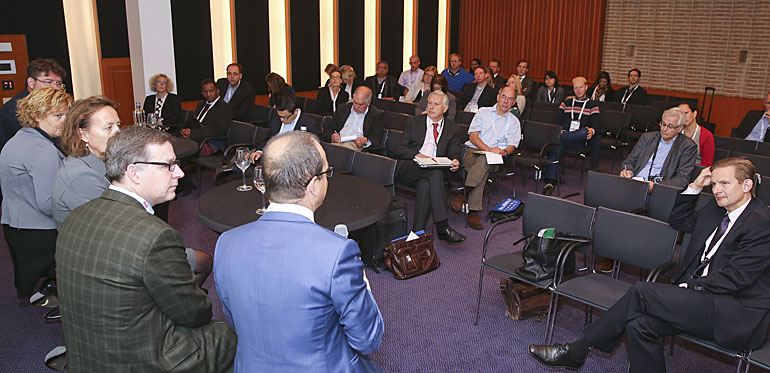 "There is much more to sustainable water use than just good water stewardship on the perimeter of your industrial site. It is not restricted to meeting scientifically based figures. It is also about local interests, about politics and about conceptions", said André Fourie of one of the world's largest brewing companies, SAB Miller, during the early AIWW morning session at the Industrial Leaders Forum on 4 November.
"There is much more to sustainable water use than just good water stewardship on the perimeter of your industrial site. It is not restricted to meeting scientifically based figures. It is also about local interests, about politics and about conceptions", said André Fourie of one of the world's largest brewing companies, SAB Miller, during the early AIWW morning session at the Industrial Leaders Forum on 4 November.
As SAB Miller's senior manager on environmental value, Fourie shared his experiences on water stewardship at the forum that was one of the highlights of the Amsterdam International Water Week and the Aquatech Amsterdam trade exhibition.
The Industrial Leaders Forum included five round table sessions on technical innovations, financial mechanisms and governance arrangements.
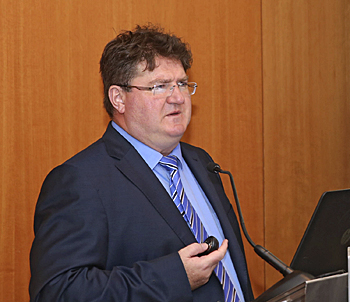 André Fourie of brewery SAB MIller noticed the importance of the local differences in culture around the world.
André Fourie of brewery SAB MIller noticed the importance of the local differences in culture around the world.
Water is too complex
Fourie of SAB Miller told that he is involved in water management at some 100 beer production sites all over the world. "Local culture is the hard part, especially for a technical oriented company as SAB Miller. Water is too complex for us and we need partnerships to reduce our risks".
The complexity also relates to the local governments, Fourie added: "The governments are in charge of protecting the water sources and have to decide on the allocation of the fresh water. But the decision processes are slow and it is not always clear what the timeframe is or who is responsible for what".
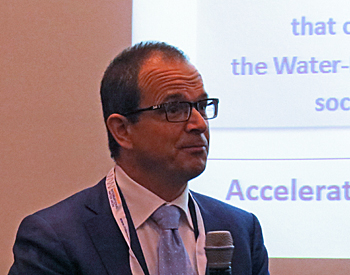 Piet Klop of pension fund PGGM advised the water sector to scale up.
Piet Klop of pension fund PGGM advised the water sector to scale up.
Cleaning the pond
Fourie got support from Piet Klop, senior advisor responsible investment at Dutch pension fund PGGM. Klop warned solution providers that their industrial clients are expected to do more than reduce the water use on their own sties. "It is not only about a smaller water footprint, it is also about cleaning the pond."
Big and boring, small and exciting
Klop touched up on the subject of the many small solution providers in the water sector. "PGGM has to invest 20 billion euro by 2020 but prices in the water sector make no sense. It is difficult for investors to determine the risks and the potential revenues. Another problem is the scale of the solution providers. For large pension funds as PGGM these providers are too small."
Klop spoke of a mismatch in scale. For a large pension fund as PGGM it is impossible to collect all necessary financial data. "PGGM is big and boring, solution providers are small and exciting".
In order to be of interest for large investors, the water technology sector has to scale up, he advised.
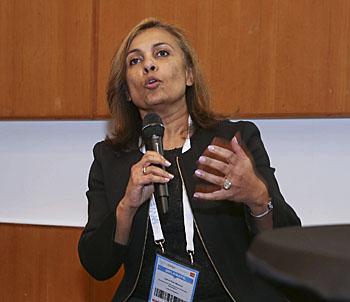 Usha Rao-Monari of global investor Blackstone asked her audience why investments on water infrastructure are lagging behind on investments in renewable energy.
Usha Rao-Monari of global investor Blackstone asked her audience why investments on water infrastructure are lagging behind on investments in renewable energy.
Water lags behind on renewable energy
Usha Rao-Monari of investment firm Blackstone confirmed that many large investors want to put money in new climate resilient infrastructure but lack confidence when it concerns water projects.
Rao-Monari is chief executive officer of Global water development partners, the water investment platform of the Blackstone Group.
In her key note she noticed that of all sustainably labelled investments some 90 percent goes to climate and renewable energy. Why is the water sector lagging behind, she asked her audience.
Water is about access
"Water is about access and relates to social issues", she answered. This makes the water tariffs a political issue and as a result the water price does reflect the true value.
"Without mitigation actions the world will face a growing demand for water that outstrips available fresh water supplies with 40 percent by 2030. This makes water scarcity a very real issue", said Rao-Monari and yet it does not convince investors to put money in the water sector.
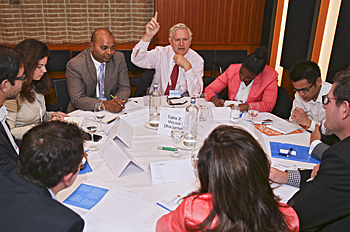 The forum included five round table sessions that focused on technical innovation, financial mechanisms, and governmental arrangements.
The forum included five round table sessions that focused on technical innovation, financial mechanisms, and governmental arrangements.
More coherent water infrastructure
Rao-Monari made two suggestions. "The water sector has a communication problem. Water professionals have to start speaking to other sectors about water as an economic resource that is finite".
She had seen 'pretty cool' disruptive innovations in the water sector. "But these solutions are hardly known outside the water sector. Bring it better to the table", she advices.
Her other suggestion concerned the business model of the water sector. "Governments can contribute to the scalability by creating more coherent policies, for instance by connecting the water resources, the drinking water supply and the waste water treatment in one infrastructure model."
(photos by Rob Kamminga)
Read also on this website
● AIWW Aquatech: Polish region of Poznan and Dutch province to cooperate on revitalisation Warta river, 10 November 2015
● AIWW Aquatech: Exhibition floor shows plenty water treatment technology for recovery, 9 November 2015
● AIWW Aquatech: Young water professionals want less talking, more action, 6 November 2015
● AIWW Aquatech: Mozambique and the Netherlands agree on water supply and flood risk management projects, 5 November 2015
● AIWW Aquatech: VEI and World Resources Institute join forces on green utilities, 5 November 2015
● AIWW Aquatech: Royal HaskoningDHV and World water academy establish special academy for Nereda technology, 5 November 2015
● AIWW Aquatech 2015: Award winners Salttech and Safi Sana honoured during opening ceremony, 3 November 2015
● AIWW Aquatech 2015: Opening ceremony marks tremendous global water challenges ahea, 2 November 2015
● Buzzing city: Water professionals start to gather for Amsterdam International Water Week, 31 October 2015
● Meet the Dutch water sector at AIWW2015
More information
Amsterdam International Water Week
www.internationalwaterweek.com
Aquatech Amsterdam
www.aquatechtrade.com/amsterdam



